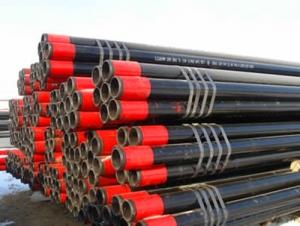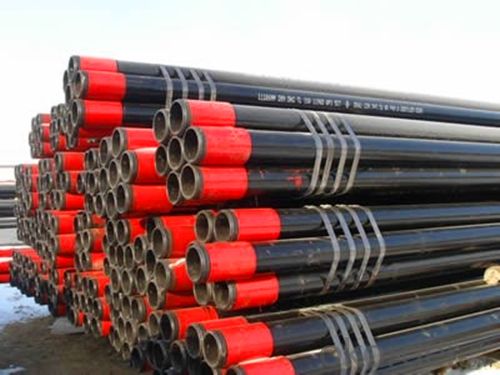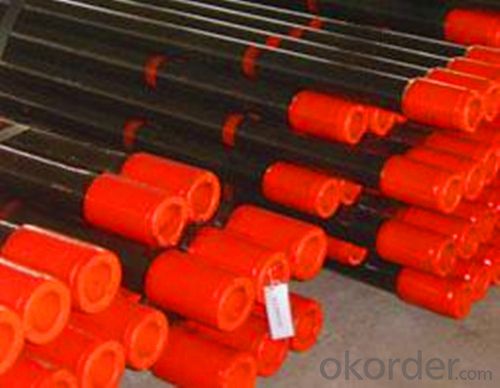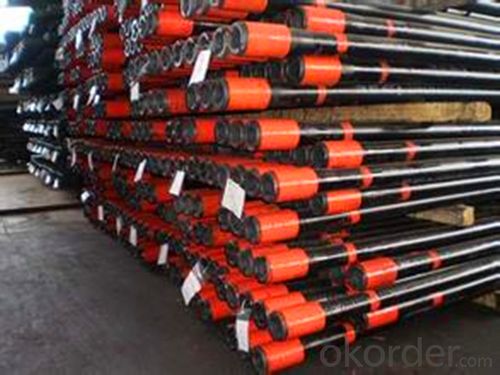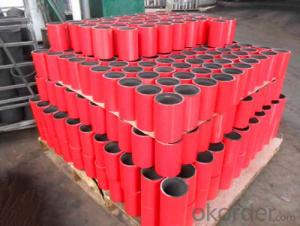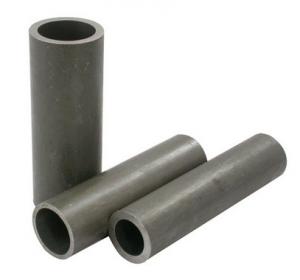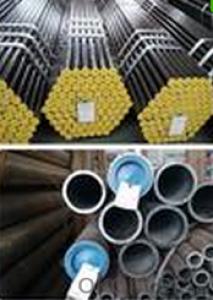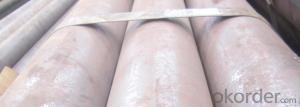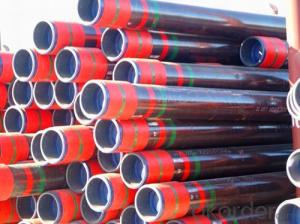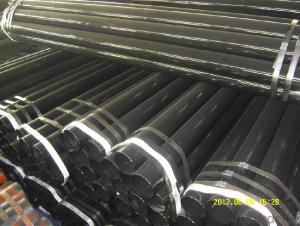Tubing Pipe of Grade N80 with API Standard
- Loading Port:
- Qingdao
- Payment Terms:
- TT OR LC
- Min Order Qty:
- 20 m.t.
- Supply Capability:
- 1000 m.t./month
OKorder Service Pledge
OKorder Financial Service
You Might Also Like
1. Structure of Tubing Pipe of Grade N80 Description
API 5CT Steel Pipe, N80Q Oil/Petroleum tubing Pipe, OCTG
1) Size: O.D. 1.900", 2-3/8", 2-7/8", 3-1/2", 4-1/2"
2) Grade: J55, N80, L80, C90, T95, P110
3) Wall thickness: 3.18 - 10.54mm
4) Length: R1,R2,R3
5) Thread: 8RD and 10RD
6) All our Tubing accord with API SPEC 5CT standard.
2. Main Features of Tubing Pipe of Grade N80
1) Advanced test for quality
2) MTC, COC provided
3) Supervision is welcome
3. Tubing Pipe of Grade N80 Images
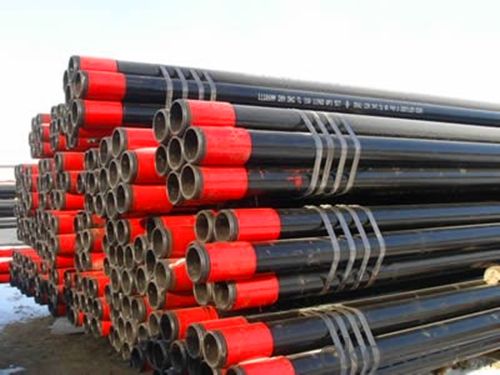
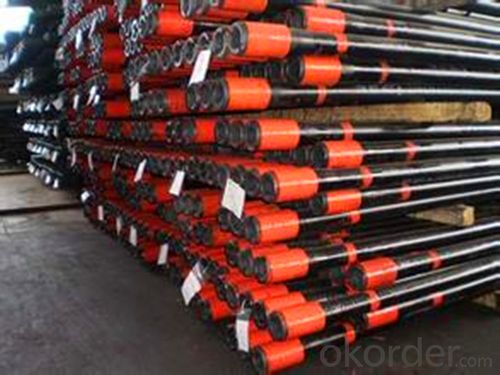
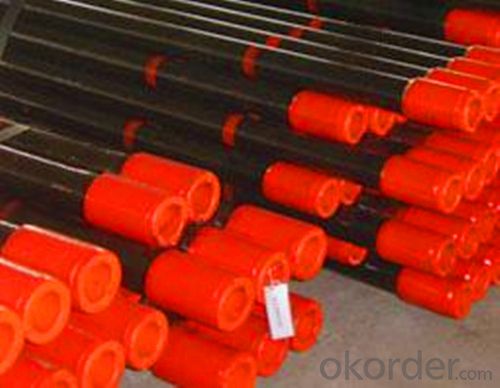
4. Tubing Pipe of Grade N80 Specification
Size Destination | Weight Destination | Outside Diameter | Wall Thickness | Type of End Finish | ||||||||
Grade | ||||||||||||
T&C Non-Upset | T&C External Upset | in | mm | in | mm | J55 K55 | L80 | N80 | C90 | T95 | P110 | |
1.900 | 2.40 | - | 1.900 | 48.26 | 0.125 | 3.18 | PI | - | - | - | - | - |
2.75 | 2.90 | 0.145 | 3.68 | PNUI | PNUI | PNUI | PNUI | PNUI | - | |||
3.65 | 3.73 | 0.200 | 5.08 | PU | PU | PU | PU | PU | PU | |||
4.42 | - | 0.250 | 6.35 | - | P | - | P | P | - | |||
5.15 | - | 0.300 | 7.62 | - | P | - | P | P | - | |||
2 3/8 | 4.00 | - | 2.375 | 60.3 | 0.167 | 4.24 | PN | PN | PN | PN | PN | - |
4.00 | 4.70 | 0.190 | 4.83 | PNU | PNU | PNU | PNU | PNU | PNU | |||
5.80 | 5.95 | 0.254 | 6.45 | - | PNU | PNU | PNU | PNU | PNU | |||
6.60 | - | 0.259 | 7.49 | P | P | P | P | P | - | |||
7.35 | 7.45 | 0.336 | 8.53 | PU | PU | PU | PU | PU | - | |||
2 7/8 | 6.40 | 6.50 | 2.875 | 73.02 | 0.217 | 5.51 | PNU | PNU | PNU | PNU | PNU | PNU |
7.80 | 7.90 | 0.276 | 7.01 | - | PNU | PNU | PNU | PNU | PNU | |||
8.60 | 8.70 | 0.308 | 7.82 | - | PNU | PNU | PNU | PNU | PNU | |||
9.35 | 9.45 | 0.340 | 8.64 | - | PU | - | PU | PU | - | |||
10.50 | - | 0.392 | 9.96 | - | P | - | P | P | - | |||
11.50 | - | 0.440 | 11.18 | - | P | - | P | P | - | |||
3 1/2 | 7.70 | - | 3.500 | 88.9 | 0.216 | 5.49 | PN | PN | PN | PN | PN | - |
9.20 | 9.30 | 0.254 | 6.45 | PUN | PUN | PUN | PNU | PNU | PUN | |||
10.20 | - | 0.289 | 7.34 | PN | PN | PN | PN | PN | - | |||
12.70 | 12.95 | 0.375 | 9.53 | - | PUN | PUN | PNU | PNU | PUN | |||
14.30 | - | 0.430 | 10.92 | - | P | - | P | P | - | |||
15.50 | - | 0.476 | 12.00 | - | P | - | P | P | - | |||
17.00 | - | 0.530 | 13.46 | - | P | - | P | P | - | |||
4 | 9.50 | - | 4.00 | 101.6 | 0.226 | 5.74 | PN | PN | PN | PN | PN | PN |
10.70 | 11.00 | 0.262 | 6.65 | PU | PU | PU | PU | PU | PU | |||
4 1/2 | 12.60 | 12.75 | 4.500 | 114.3 | 0.271 | 6.88 | PNU | PNU | PNU | PNU | PNU | - |
15.20 | - | 0.337 | 8.56 | - | P | - | P | P | - | |||
17.00 | - | 0.380 | 9.65 | - | P | - | P | P | - | |||
18.90 | - | 0.430 | 10.92 | - | P | - | P | P | - | |||
21.50 | - | 0.500 | 12.70 | - | P | - | P | P | - | |||
23.70 | - | 0.560 | 14.22 | - | P | - | P | P | - | |||
26.10 | - | 0.630 | 16.00 | - | P | - | P | P | - | |||
5. FAQ of Tubing Pipe of Grade N80
We have organized several common questions for our clients,may help you sincerely:
①How about your company?
One of the leading manufacturers and suppliers specializing in steel pipe products in China, mainly offering four series steel pipes including welded steel pipe (ERW, SSAW, LSAW and square and rectangle pipe), seamless steel pipe, hot dipped galvanized steel pipe and steel pipe with 3 layer polythene coating. We can provide customers different specification standards e.g. ASTM A53, ASTM A106, BS1387, API 5L, API 5CT, ISO3183 and etc. Our scope of supplying covers from 1/2" to 48" for the outside diameter of welded pipes, and 1/8" to 20" for the seamless pipes.
Other than steel pipes we are also capable of supplying a wide variety of pipeline accessories, steel pipe fittings; valves etc. consists of our one-stop sales. The integrated sales & service ensures customers with various demands an easier access for purchasing management.
②How to guarantee the quality of the products?
We have established the international advanced quality management system,every link from raw material to final product we have strict quality test;We resolutely put an end to unqualified products flowing into the market. At the same time, we will provide necessary follow-up service assurance.
③How long can we receive the product after purchase?
In the purchase of product within three working days, We will arrange the factory delivery as soon as possible.
- Q: How are steel pipes classified according to their wall thickness?
- Steel pipes are classified according to their wall thickness into various categories such as standard, extra strong, and double extra strong.
- Q: Can steel pipes be used for underground electrical conduits?
- Yes, steel pipes can be used for underground electrical conduits. Steel pipes are durable, strong, and resistant to external forces, making them suitable for protecting electrical wiring in underground installations. Additionally, steel pipes offer excellent corrosion resistance, ensuring the longevity and safety of the electrical system.
- Q: What are the common factors affecting the flow capacity of steel pipes?
- The flow capacity of steel pipes can be affected by several common factors. Firstly, the diameter of the pipe plays a crucial role. A larger diameter allows for a greater flow capacity because there is more area for the fluid to pass through. Secondly, the length of the pipe also affects flow capacity. Longer pipes tend to have higher frictional losses, which can decrease the flow capacity. Thirdly, the internal surface roughness of the steel pipe can impact flow capacity. Rough surfaces create more friction, resulting in a lower flow rate. Conversely, smooth pipes allow for smoother flow and higher flow capacity. The properties of the fluid being transported through the steel pipe are another important consideration. Factors such as viscosity, temperature, and density can all influence the flow rate. For example, highly viscous fluids have a lower flow capacity compared to less viscous fluids. Additionally, pressure drop along the length of the pipe is a significant factor. Friction, bends, and restrictions can all cause pressure losses, resulting in a lower flow capacity. The material of the steel pipe and its wall thickness also play a role. Different materials have varying properties that can impact flow rates. Moreover, thicker walls can reduce the internal diameter of the pipe, leading to a lower flow capacity. Lastly, the design and layout of the pipe system, including the presence of fittings, can impact flow capacity. Fittings such as valves, elbows, and tees can cause additional pressure drops and turbulence, reducing the overall flow rate. Considering these factors is essential when designing or evaluating a steel pipe system to ensure optimal flow capacity and efficiency.
- Q: What are the main components of a steel pipe?
- The main components of a steel pipe include the steel material itself, which is typically made from carbon and alloy steel, as well as various coatings or linings that can be applied to enhance its durability and resistance to corrosion. Additionally, a steel pipe may also have fittings such as flanges or couplings, and may be further reinforced with supports or braces depending on its intended use.
- Q: What are the factors affecting the pressure rating of steel pipes?
- The factors affecting the pressure rating of steel pipes include the material of the pipe, its thickness, diameter, and quality, as well as the temperature and type of fluid being transported. Additionally, the operating conditions, such as the level of stress or strain on the pipe, also play a significant role in determining its pressure rating.
- Q: Can steel pipes be used for underground fire protection systems?
- Yes, steel pipes can be used for underground fire protection systems. Steel pipes are commonly used in these systems due to their durability, strength, and resistance to fire. They can effectively withstand high temperatures and provide reliable and long-lasting protection against fire hazards in underground environments.
- Q: How are steel pipes used in the chemical industry?
- Steel pipes are commonly used in the chemical industry for various applications including the transportation of corrosive chemicals, as well as for transferring fluids and gases at high temperatures and pressures. These pipes are durable, resistant to corrosion, and can withstand harsh working conditions, making them ideal for handling chemicals in industrial settings.
- Q: What is the difference between steel pipes and cast iron soil pipes?
- The main difference between steel pipes and cast iron soil pipes lies in their composition and durability. Steel pipes are primarily made of steel, a strong and versatile material known for its high tensile strength. On the other hand, cast iron soil pipes are made of cast iron, a material known for its excellent corrosion resistance and sound-dampening properties. While steel pipes are more rigid and suitable for carrying pressurized fluids, cast iron soil pipes are designed specifically for wastewater and sewage systems due to their superior resistance to rust and noise reduction qualities.
- Q: DN150 welded steel tubes one meter multiple
- DN150 welded steel pipe according to the thickness of two specifications: outer diameter 165mm, wall thickness 4.5mm, 17.81Kg per meter weight, wall thickness of 5.5mm, 21.63Kg. per meter weight
- Q: Are steel pipes suitable for high-pressure applications?
- Yes, steel pipes are suitable for high-pressure applications. Steel pipes are known for their strength and durability, making them ideal for handling high-pressure applications. They can withstand the internal pressure exerted by fluids or gases under high pressure without deforming or bursting. The high tensile strength of steel allows it to resist the forces that occur in high-pressure environments, ensuring the safety and reliability of the piping system. Additionally, steel pipes can be manufactured with thicker walls to further enhance their ability to withstand high pressures. Steel pipes are widely used in industries such as oil and gas, petrochemical, power generation, and water distribution, where high-pressure applications are common.
Send your message to us
Tubing Pipe of Grade N80 with API Standard
- Loading Port:
- Qingdao
- Payment Terms:
- TT OR LC
- Min Order Qty:
- 20 m.t.
- Supply Capability:
- 1000 m.t./month
OKorder Service Pledge
OKorder Financial Service
Similar products
Hot products
Hot Searches
Related keywords
